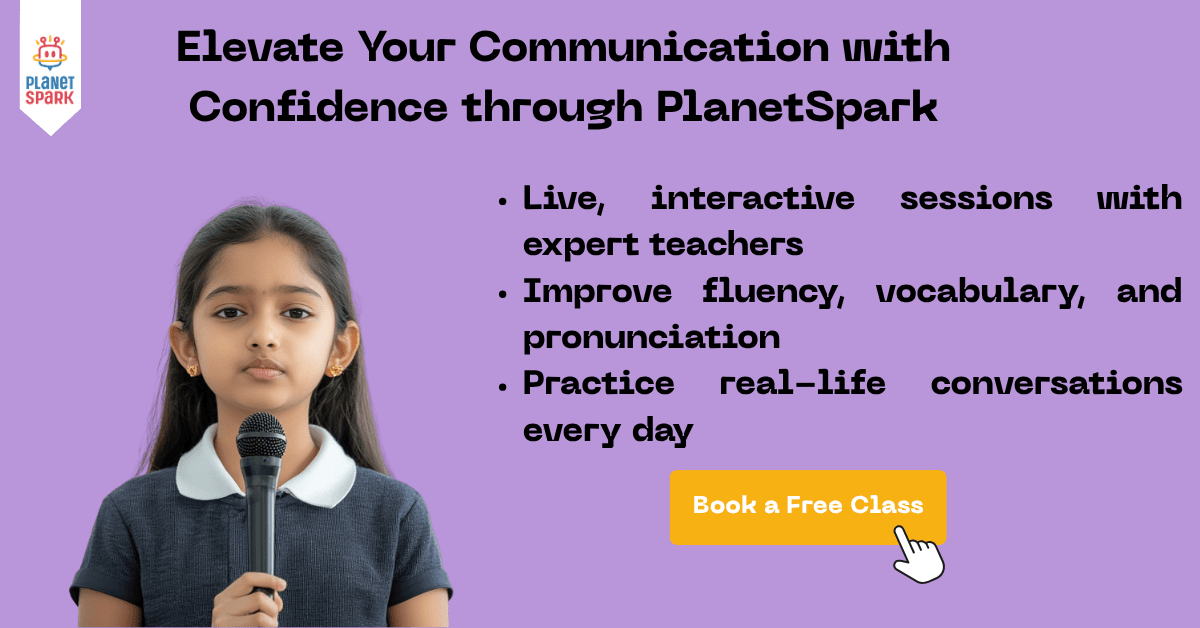Importance of English Communication for Child Growth
Last Updated At: 28 Oct 2025
8 min read

Table of Contents
- What is English Communication and Why It Matters
- How English Communication Shapes a Child’s Development
- Core Components of Effective English Communication
- English Communication and Emotional Intelligence
- How English Communication Fuels Creativity and Imagination
- The Role of Parents and Teachers in Building English Communi
- English Communication: Preparing Children for the Future
- Why Choose PlanetSpark for Building Communication Skills?
In today’s fast-paced, globally connected world, English Communication is a fundamental skill every child must master. It’s not just about speaking in English; it’s about thinking clearly, expressing confidently, and connecting meaningfully with others. Strong English Communication empowers children to succeed academically, socially, and emotionally. This blog explores how mastering English Communication can shape a child’s overall development and future success.
What is English Communication and Why It Matters
English Communication is the ability to convey ideas, emotions, and information effectively in English through speaking, listening, reading, and writing. It plays a crucial role in how children learn, express themselves, and interact with the world.
Children who develop English Communication early build a strong foundation for academic learning and personal growth. It shapes their thinking, improves comprehension, and builds confidence to speak and lead.
How English Communication Impacts Children’s Growth
It enhances understanding and learning in all subjects taught in English.
It boosts confidence to participate in class and interact with peers.
It helps children express their ideas clearly and logically.
It prepares them to face global opportunities in education and beyond.
When a child can express thoughts clearly in English, it reflects not just language ability, but emotional maturity, leadership, and creativity.

How English Communication Shapes a Child’s Development
English Communication is more than a linguistic skill; it’s a tool that nurtures intellectual, emotional, and social development. Here’s how mastering communication in English supports holistic child growth.
Cognitive Development
When children learn to communicate in English, their brains process new vocabulary, sentence structures, and meanings. This strengthens memory, focus, and problem-solving skills. Bilingual or multilingual children often show better multitasking and critical thinking abilities.
Academic Excellence
Most schools use English as the primary language of instruction. A child who communicates effectively in English performs better academically because they understand lessons faster, write more effectively, and participate actively in discussions. They learn to express complex ideas confidently, an essential skill for long-term academic success.
Confidence and Social Participation
Children who speak English fluently feel more confident in public and social settings. They begin contributing to conversations, presenting ideas in class, and interacting comfortably with people outside their immediate circle. This builds leadership and self-assurance from a young age.
Core Components of Effective English Communication
To build strong English Communication skills, children must develop four essential abilities: listening, speaking, reading, and writing. These components form the backbone of meaningful communication and can be nurtured through simple, daily practices.
Listening: The First Step to Understanding
Active listening builds focus and comprehension. When children listen to English conversations, audiobooks, or stories, they pick up tone, pronunciation, and expression naturally. It also helps them understand context and emotion, improving their ability to respond meaningfully.
Speaking: Building Confidence and Fluency
Speaking fluently in English allows children to share thoughts without fear. Encouraging them to speak daily, whether through storytelling, reading aloud, or role play, improves fluency. Constructive feedback helps them pronounce better and form grammatically correct sentences.
Reading: Expanding Agination and Vocabulary
Reading English books, stories, or articles introduces children to new words and sentence patterns. It enriches their imagination, builds grammar intuitively, and enhances comprehension. Regular reading also inspires creativity and curiosity.
Writing: Expressing with Clarity
Writing allows children to translate their thoughts into structured ideas. Journaling, letter writing, or creative writing exercises improve sentence formation and vocabulary. Writing regularly sharpens organization, clarity, and expression.
Strengthen all four pillars of English Communication with PlanetSpark’s expert mentors and interactive curriculum.
English Communication and Emotional Intelligence
English Communication isn’t just about grammar or fluency; it’s also the language of emotion, empathy, and connection. When children can express how they feel in English, they begin to understand their emotions better and manage them effectively.
Children who can say, “I’m nervous before my presentation” or “I felt happy when I helped my friend” are developing a crucial life skill, emotional intelligence. The ability to identify, name, and express emotions through language is a sign of maturity and mental clarity.
Encouraging Emotional Awareness
Parents and teachers should create safe spaces where children can talk openly. Encourage them to describe feelings, reflect on situations, and use English to communicate empathy and kindness. For example, sharing thoughts about their day or feelings about a challenge helps build both vocabulary and self-awareness.
Fostering Respect and Empathy
English Communication also teaches perspective-taking. When children engage in conversations, debates, or group activities, they learn to listen, understand, and respond respectfully. This nurtures empathy, patience, and teamwork, qualities that shape emotionally balanced individuals.
How English Communication Fuels Creativity and Imagination
Every great thinker, writer, and innovator began with the ability to express ideas freely. English Communication gives children the linguistic tools to turn imagination into expression.
When children can communicate in English, they start thinking in broader ways. They can tell stories, invent characters, describe emotions, and even share their ideas on global issues. Creativity begins where language meets curiosity.
The Power of Storytelling
Storytelling is one of the most effective tools for developing creativity. When children tell stories in English, they learn to structure their thoughts, sequence events, and express emotions. It builds not only linguistic skills but also creative thinking.
Imaginative Play and Expression
Encouraging children to use English in role plays or creative projects helps them explore imagination confidently. Whether they’re pretending to be scientists, authors, or explorers, using English strengthens both imagination and articulation.
Creative Writing and Thinking
Writing poetry, essays, or short stories in English lets children dive deeper into their thoughts. It also helps them experiment with new ideas, vocabulary, and styles, all while building their creative potential.
Ignite your child’s imagination with PlanetSpark’s Creative Communication and Storytelling Programs.
The Role of Parents and Teachers in Building English Communication
Parents and teachers play a vital role in shaping how children communicate. Building strong English Communication doesn’t happen overnight; it’s a collaborative journey supported by home and school.
At Home: Create a Language-Rich Environment
Children learn by imitation. When parents use English in conversations, reading sessions, or storytelling, it encourages children to do the same.
Make English a part of everyday life, label household items in English, read bedtime stories, or discuss daily routines in English.
At School: Encouraging Expression
Teachers should emphasize participation and self-expression over memorization. Encouraging debates, group discussions, and presentations helps students use English naturally and fearlessly.
Regular feedback and appreciation motivate children to keep improving their English Communication without the fear of being judged.
Collaborative Learning
When parents and teachers work together, children progress faster. Schools can host English storytelling sessions, communication games, or speech competitions. Parents can support by practicing at home and celebrating small milestones.
English Communication: Preparing Children for the Future
In the 21st century, communication is the most valuable skill a person can have. From interviews and teamwork to leadership and innovation, English Communication stands at the center of every opportunity.
Children who learn English Communication early have a massive edge. They can share ideas clearly, collaborate globally, and lead confidently. This skill helps them transition smoothly from school to real-world scenarios.
Career Readiness
English is the universal business language. Whether it’s an interview, a presentation, or an international collaboration, fluency and clarity matter. Early communication practice builds comfort that lasts a lifetime.
Global Citizenship
Children with strong English Communication connect easily across borders. They can understand diverse perspectives and express their own in multicultural environments. In a world that values inclusion and innovation, communication becomes its passport to success.
Adaptability and Leadership
Good communicators are great leaders. They can motivate, guide, and collaborate effectively. English Communication equips children to adapt in fast-changing environments, making them resilient, confident, and forward-thinking.

Why Choose PlanetSpark for Building Communication Skills?
PlanetSpark offers a structured and creative approach to developing English Communication for children through interactive sessions, real-world practice, and expert mentorship. The programs are designed not just to improve speaking, but to build complete communicators, confident, expressive, and empathetic.
What Makes PlanetSpark Unique
1:1 live communication sessions guided by expert mentors
Fun and engaging activities, including debates, storytelling, and role plays
Personalized feedback to track progress and boost confidence
Focus on fluency, body language, and vocal expression
Integration of creative writing and public speaking for well-rounded growth
Unlocking the Power of Expression in Every Child
English Communication is more than a skill; it’s a life-changing strength that shapes who a child becomes. It builds confidence, sharpens intellect, fuels creativity, and prepares children for the future.
In a world where expression is power, helping your child communicate effectively in English means giving them the courage to lead, connect, and dream big. With the right guidance and practice, every child can become a confident communicator who inspires and influences others.
Empower your child’s future today with PlanetSpark’s specialized Communication Skills Courses, where learning meets expression.
Frequently Asked Questions
Children can begin as early as six years old. The curriculum is age-appropriate, with progressive modules that grow with the child’s learning level and creative capacity.
PlanetSpark combines creativity with structure. Instead of rote writing drills, it teaches story frameworks, vocabulary enhancement, and real publishing opportunities, helping children become confident, expressive writers.
The program covers a wide range of genres, including short stories, poetry, essays, persuasive letters, journal writing, and book reviews. Each genre helps students master tone, structure, and creativity.
Through guided frameworks like S.T.O.R.Y and PEEL, along with real-time feedback, editing sessions, and peer reviews, children learn to refine their ideas, structure content, and write with clarity.
Yes. Students can publish their stories and poems on PlanetSpark’s blog, e-magazine, and co-authored anthologies, giving them real-world exposure and confidence as young authors.
Personalized Communication Report
Record a video to get a AI generated personalized communication report for your child
Select Learner's Class

Hi There, want to try these
tips for your child with
LIVE with our expert coach?
Let's check your child's
English fluency
